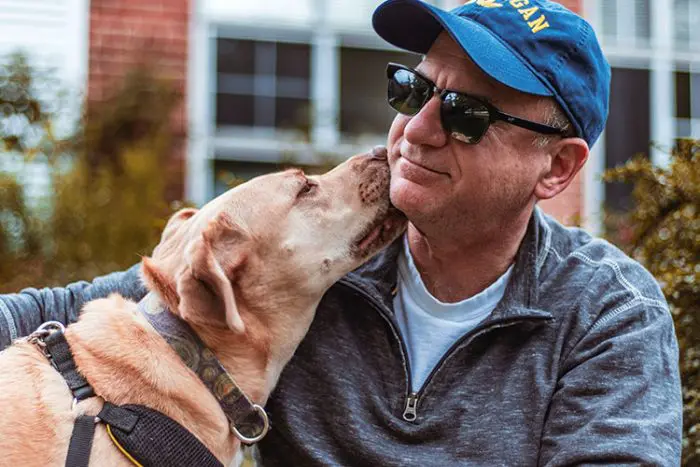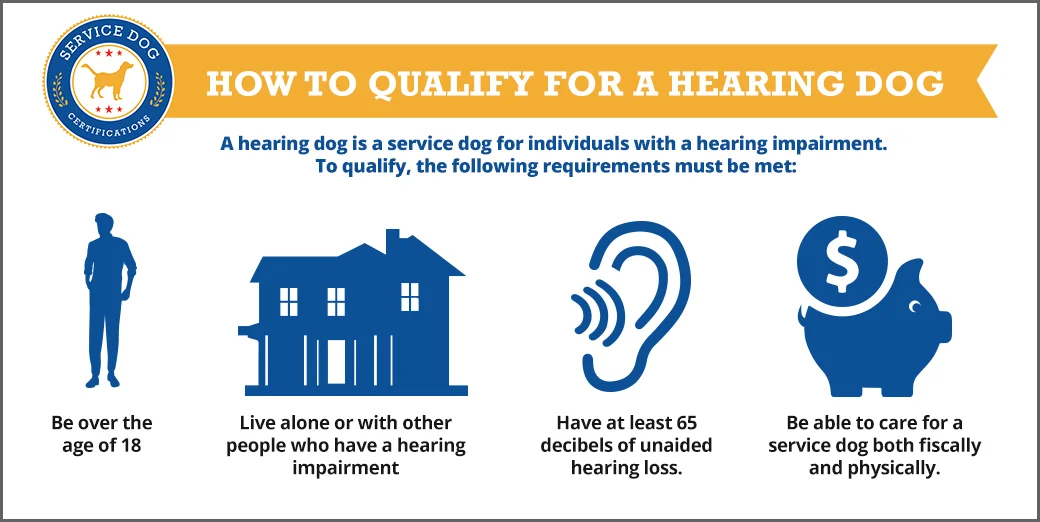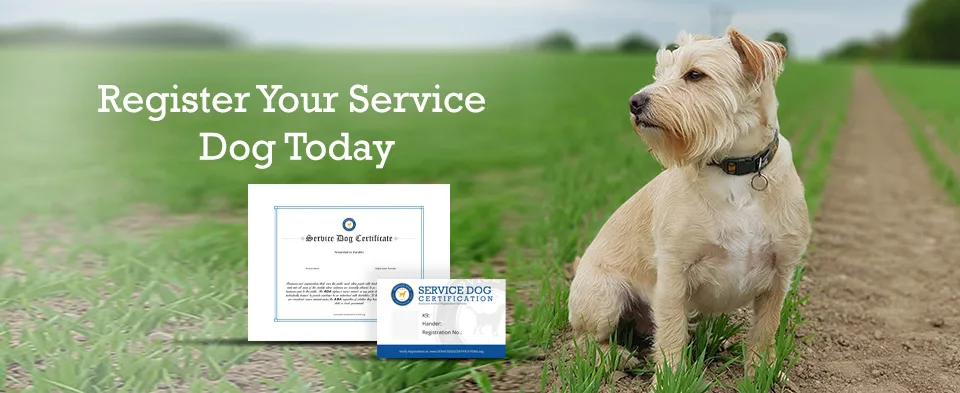Home Page › Blog › Can You Get a Service Dog for Hearing Loss
Can You Get a Service Dog for Hearing Loss

According to the National Institute on Deafness and Other Communication Disorders (NIDCD), about 2 percent of Americans ages 45-54 have some hearing loss that accounts for a disability. Hearing loss can impair a person’s quality of life in many ways, affecting their self-esteem, work or school performance, mental health, and relationships. What’s more, hearing loss can impact a person’s safety, putting them at risk in everyday situations like crossing the street or walking through a crowd. Fortunately, a service dog can help individuals with hearing loss navigate these situations safely and improve their quality of life.
What Is a Hearing Dog?
Service dogs help people in all sorts of ways, like detecting low blood sugar in individuals with diabetes or preventing people with mobility issues from falling. Service dogs for hearing loss assist the deaf or hearing-impaired. Because service dogs are protected under federal law, a hearing dog can accompany their handler anywhere the public is allowed — even in areas where pets are not typically permitted.
Hearing dogs receive training to help their handler with various tasks, such as alerting their handler of doorbells, smoke alarms, crying babies, and approaching vehicles. Because of their skills, a service dog can be a life-changing investment for someone with a hearing impairment, providing both companionship and assistance with daily life.
Who Can Qualify for a Hearing Dog?
To qualify for a hearing service dog, several specifications must be met. The handler of the hearing dog must be:
- Over the age of 18.
- Live alone or with other people who have a hearing impairment.
- Have at least 65 decibels of unaided hearing loss.
- Be able to care for a service dog both fiscally and physically.
Additional requirements may apply, depending on where the service dog comes from. For example, International Hearing Dog, Inc. (IHDI), the first federally recognized organization to train hearing dogs, does not place their service dogs in homes where other dogs reside because other dogs may interfere with bonding. IHDI also believes other dogs may distract a hearing dog and prevent them from doing their work successfully.
Where Can I Take a Hearing Service Dog?
Service dogs, in general, can accompany their handler anywhere the public is allowed. Even when pets aren’t allowed, a service dog may enter the area. However, many hearing dogs only assist their handler within the home. Other hearing dogs may help their owner both inside the home and out in public.
The Americans with Disabilities Act (ADA) protects the right of a service dog handler to have their dog with them in public areas. The Fair Housing Act (FHA) ensures that service dogs live with their owner, including “no pets allowed” areas.
When flying with hearing dogs, the Air Carrier Access Act (ACAA) makes traveling possible. Some states also have their own laws applicable to service dogs in general and hearing dogs in particular. Therefore it’s always best to research state law before purchasing or traveling with a hearing dog.
Hearing dogs who work outside the home must have public access skills. These skills ensure that a dog is safe enough to bring out into the community. Unlike most dogs, service dogs remain with their handlers in “no pets allowed” areas; therefore, they must be obedient at all times, even when faced with a large, noisy crowd or other animals.

How to Find the Right Hearing Dog
The right hearing dog very much depends on the individual’s needs and preferences they’re working for. There’s no definite breed or size that a hearing service dog must be. Existing programs, like IHDI, N.E.A.D.S., and Canine Companions, have trained dogs for purchase that are matched to the right handler. Some programs may also have additional qualifications and benefits. Canine Companions, for example, asks that their applicants attend a two-week course and participate in ongoing support programs.
For the most part, service dog programs work diligently to ensure that their dogs are placed into the right homes. Prospective service dog owners should have the financial ability to care for a hearing dog, and the home environment should be safe for a dog. Individuals who live in smaller homes or apartments may want a medium or small hearing dog.
For people who feel that a hearing dog might benefit their situation, a consult with a physician is an excellent start. A physician can evaluate how a hearing dog may assist and what needs may be met. When searching for a trained hearing dog, the physician’s assessment can serve as a guide for which dogs are more suited to the individual’s needs.
About the Author: The writing team at Service Dog Certifications is made up of folks who really know their stuff when it comes to disability laws and assistance animals. Many of our writers and editors have service dogs themselves and share insights from their own experiences. All of us have a passion for disability rights and animals.
4 comments
Leave a Reply Cancel reply
Latest Posts

How to Bring a Service Dog to Disneyland
Trained service dogs are more than welcome to join their handlers at Disneyland. In this guide, we’ll explain Disneyland’s policies and give practical advice for bringing a service dog to Disneyland for the first time. Disneyland’s Service Dog Policies The Magic Kingdom is happy to welcome trained service dogs across most park locations! They kindly […]

Read More

Can Dogs Eat Tomatoes?
Yes! Dogs can safely enjoy tomatoes, but there are a few risks to be aware of so you can feed your dog responsibly. Fully ripe tomatoes (without the stems and leaves) can actually have nutrients that are good for your pup. Tomatoes have chlorogenic acid, an antioxidant that can have anti-inflammatory effects in cells. They’re […]

Read More

Can a Primary Care Doctor Write an ESA Letter?
Your family doctor, also called a primary care physician (PCP), can write a letter recommending an emotional support animal. We’ll explain what legally gives them that ability and explore what better options might be available for you. Why are Physicians Able to Write an ESA Letter? To turn your pet into an emotional support animal, […]

Read More








So if my husband is not hearing impaired I cannot get a service dog?
Service dogs do much more than just help the hearing impaired. You can find some examples here: https://www.servicedogcertifications.org/service-dog-training-guide-the-basics/
I am interested in a service dog for the hearing impaired. Both my husband and I are very hard of hearing. He uses 2 hearing aides but still doesn’t hear well. I have a cochlear implant on one side and a hearing aide on the other. Without these hearing appliances I am basically deaf. I need a small to medium sized dog that doesn’t shed. Please advise me on how to proceed with this application.
Unfortunately we do not provide references for service dog adoptions or training. Our services are only for already qualified service dog owners. You may want to start by having a conversation with your healthcare provider.